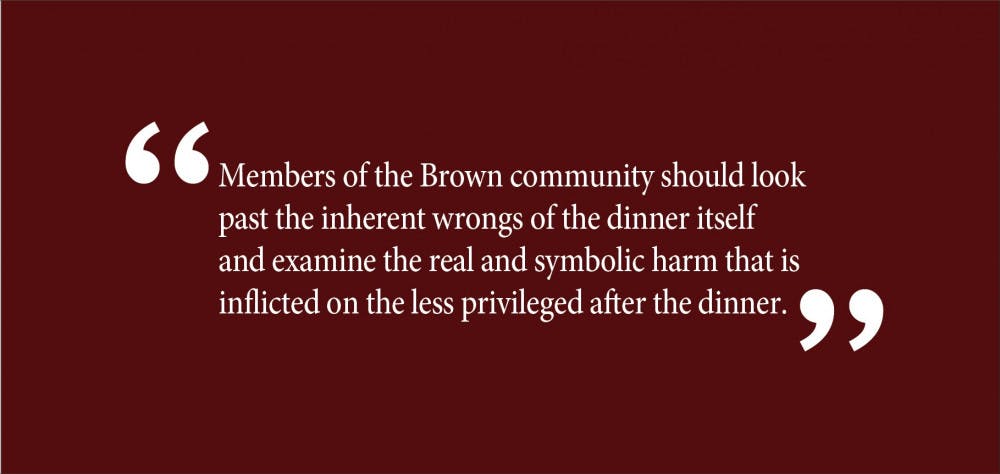Last week, the Brown community was rocked by an article in the Providence Journal detailing the role that the University played in coordinating a dinner for well-connected students hosted by a wealthy donor. Naturally, these allegations dominated our campus dialogue for the better part of a week. In class discussions, conversations at dining halls and some especially fiery memes, Brown students have been rightfully indignant of the privileges that wealth affords on our campus. But now that we’ve had more time to digest the article and the allegations of special treatment for a select group of students, it’s only right that we examine ourselves and the nature of our criticisms.
Yes, there are some clear-cut wrongs: the University should have had no role in coordinating a dinner only available to Brown’s elite class. Indeed, much of the commentary has correctly focused on how the dinners demonstrate the uneven playing field that first-generation and low-income students face coming into Brown. That the University provided “logistical support,” even if they have pledged to cease doing so, for an exclusive dinner where attendees might have had access to potential job opportunities only worsens that disparity.
But even more sinister are the allegations of undue influences that these students receive after the dinner occurs. Members of the Brown community should look past the inherent wrongs of the dinner itself and examine the real and symbolic harm that is inflicted on the less privileged after the dinner.
The dinner has tangible impacts for those invited. According to the article, influential donors have allegedly arranged for students to receive better on-campus housing options or off-campus permission after being denied in the first round. Not only does this violate any claim to an “equitable” distribution of Brown’s on-campus housing stock, it is also absolutely offensive. We should all be outraged that a student’s connections can result in better housing, given that on-campus options are limited and vary notoriously in quality.
Additionally, because the number of students who receive off-campus permission is limited, some students will inevitably be forced to pay for on-campus housing, even though Brown’s housing costs can be hundreds, if not thousands, of dollars more than the housing costs of the East Side, according to Trulia, an online real estate guide. Not only does it appear possible for the attendees of the dinner to receive better housing from Brown as a function of their influence, it is also possible that they pay less for their housing. This is as regressive as it is wrong.
Tellingly, President Christina Paxson P’19’s response in the Providence Journal to the allegations did not focus on the real harm caused by the dinners. Instead, she maintained that the central administration knew nothing and that the Advancement Office would no longer play any role in coordinating future dinners. This response misconstrues what all members of the Brown community should find problematic about the event — that the administration’s internal processes, including those that deal directly with students, can be influenced by the right amount of money.
However, the consequences go beyond just ResLife or job searches — the dinner is symbolic of the host of issues that non-wealthy students face on campus. In what is perhaps the biggest indictment of Brown’s culture, the general sentiment in reaction to the article was that students were not surprised by an instance in which wealthy students were privileged. We’ve been gaslighted into normalizing this behavior with indelible consequences for those who are not the privileged few.
We only need to look around to see just how the dinners represent one of many ways that Brown’s culture can be non-welcoming and potentially antagonistic toward the non-wealthy. Those examples include professors who require students to purchase a $50 book, only to have them read a single chapter. It’s the opacity and difficulty of obtaining emergency discretionary funds. It’s BuDS workers having to sue the University to receive fair compensation for their labor.
These issues serve as a stark reminder of the persistent hurdles that lower income students face on a daily basis. We must be acutely aware of how the dinners symbolize both the advantages some students have and the barriers that stay up for many others.
Readers may have noticed that I never use the name of the host of the dinners throughout this piece. That’s because the fact that someone can pull strings for a select group of students is more important than elevating the notoriety of a donor who has a building named after him. Repeating his name would take away from what should now be abundantly clear: We need to eradicate the culture of privilege which allowed the dinner to occur.
So we must continue to demand that our school strive toward equity and inclusion. We must erase the priority status afforded to the most privileged students on campus. We must start thinking about how to make Brown a truly welcoming place in action and in culture for all students. Because if there’s a takeaway from this episode, it’s that Brown still has a lot of work to do.
Shawn Young ’19 can be reached at shawn_young@brown.edu. Please send responses to this opinion to letters@browndailyherald.com and op-eds to opinions@browndailyherald.com.





